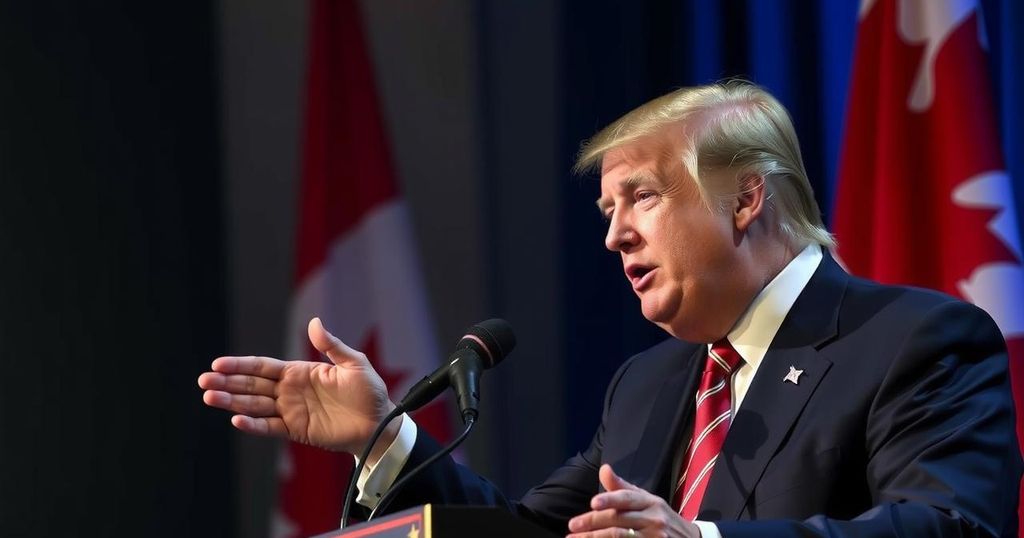Canadian Leaders Criticize Trump’s Proposed Tariffs as Economic Threat
Canadian officials, including Ontario Premier Doug Ford, have strongly criticized President-elect Trump’s proposed 25% tariffs on imports from Canada, calling it “devastating.” The Canadian government emphasizes its significant trade relationship with the U.S., while border security and illegal activity concerns are thrust into the spotlight. The outcome of these discussions could have profound economic consequences as Trump prepares to take office.
The proposal by United States President-elect Donald Trump to impose a 25% tariff on exports from Canada, alongside similar tariffs on Mexico and China, has generated significant concern in Canada. Trump justified this initiative as part of his efforts to combat illegal immigration and drug trafficking. Ontario Premier Doug Ford condemned the tariffs as “devastating,” underscoring the potential economic consequences for both Canadian and American workers. Canadian federal response has been cautious, with Prime Minister Justin Trudeau engaging in discussions with Trump and provincial leaders regarding this matter.
In official statements, Canadian ministers reaffirmed the significance of the economic relationship with the United States, citing that Canada was the largest source of U.S. crude oil imports in 2022, accounting for approximately 60% of those imports. In this context, Ford’s remarks were echoed by leaders from Quebec and British Columbia, who recognized the serious implications of Trump’s proposed tariffs. However, some industry representatives urged a measured approach, highlighting previous experience with such negotiations and expressing preparedness to navigate any potential fallout.
Trump’s administration has signaled that the 25% tariffs would be implemented on his first day in office, specifically targeting imports as leverage to spur stricter controls on illegal activities crossing the U.S.-Canada border. The heightened tensions around border security have been amplified by claims from Trump’s new border czar, Tom Homan, who characterized the northern border as a national security risk. While illegal crossings from the U.S. to Canada are less prevalent than from Mexico, recent reports suggest a worrying uptick in such activities.
Moreover, allegations about smuggling routes highlight the complexity surrounding border security issues. Past incidents illustrate the severe consequences of unlawful crossings, with tragic outcomes reported in high-profile labor trials. It remains to be seen how the Canadian government will strategize in response to these tariffs and the broader narrative surrounding border policy.
The backdrop of this situation originates from the contentious U.S.-Canada trade relationship that has evolved over decades. With trade policies often influenced by political leadership, recent fluctuations have intensified with upcoming elections and shifting priorities in border security. Trump’s election campaign promised aggressive stances against trade deficits and illegal immigration, which spotlighted Canada among other nations. The announcement of tariffs has raised alarms about potential economic impacts on not just Canadian jobs, but American jobs reliant on trade. Additionally, border security remains a critical issue, with officials raising concerns over illegal activities being routed through Canada, impacting national security discourses.
In summary, the proposed tariffs by President-elect Trump present a significant challenge to the intricate economic relations between the United States and Canada, threatening to disrupt industries and employment on both sides of the border. While Canadian leaders have expressed strong opposition to the tariffs and underscored the importance of bilateral trade, the potential implementation of 25% tariffs introduces a layer of urgency. The necessity for cooperative discussions and strategies to address shared border security concerns remains paramount as these developments unfold.
Original Source: www.bbc.com




Post Comment